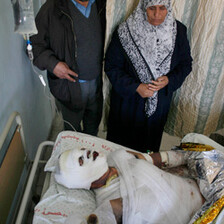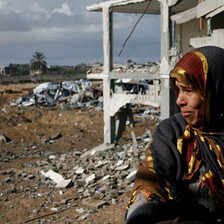East Jerusalem, Palestine 21 April 2002
We visited the home of Umm and Abu Mahmoud. Their son, Mahmoud, died during the attack on the Jenin Camp. Mahmoud was a 31 year old merchant. His wife was pregnant with their third child, but she miscarried after learning that Mahmoud was killed, reportedly by a bullet wound at the back of his head. She is now a widowed mother of two daughters, Aga, age 1, and Doha, age 3.
For the past 1 years, Mahmoud lived in a rental apartment in the Jenin camp after Israeli soldiers burned their home in the camp. For safety, his wife and children lived in the family home in Jenin city.
From the Jenin Camp, he used his cell phone to call his family on Tuesday night. He said that tanks were eight meters away from him, and he didn^’t know if he^Od be able to talk with them again. In a soft, quiet voice, he spoke with his wife, his daughters and his family members.
He was shot and killed on Wednesday morning. Neighbors heard his death reported on Montecarlo Radio.
Umm Mahmoud said that last night, Mahmoud’s daughter was crying. She said her father had gone to Paradise to get a present. She asked why he had gone to Paradise and when was he coming back..
“Mahmoud was kind,” said his mother. “He cared about his mother and father. He was our best child.” Then she told a hard story about how, at age 19, he fought with Israeli soldiers, was injured, captured, hospitalized for six months, and then sent to prison for four years. He was wounded in a confrontation with Israeli soldiers. She showed us pictures of Mahmoud as healthy athlete who had just won a soccer trophy and another as an emaciated invalid who had lost 39 kilos during the six month hospitalization in an Israeli hospital.
Mahmoud’s brother joined us. “America always help Israel, right or wrong,” he said. They give a chance to Israel. Here, nobody have chance. Now I’m 33 years old. I’m lawyer and cannot have chance to open office. I have son. I don’t know how his life will be.”
“My parents are afraid they will lose this house. They want to force all the people to go away from Palestine.”
“People are in the mountains, homeless and without shelter. In ‘48 and ‘67 or now, Israelis come with gear, tanks and planes and force you away from your home and your land and follow you. They don’t let you work, study live normal life in your home, city, family. Everyone is not safe—either killed, in prison, or gone. They make us to think about this, because this is not life.”
“We want to live in peace. We are refugees. We were living in the camp for four years before we got this house. My parents wanted to live in peace and feel safe about their children and grandchildren. They need their children. The Israelis love their children and want to live in peace. They want to live together, trying to travel, to live, to raise the sons. We are the same.”
“As a young man, I finished my studies in Moscow. I never feel any chance. 22 years in camp. I never go anyplace. I never feel how it is when children have a chance.”
Mahmoud’s neighbors, young University graduates who help us with translation, offered their views. “Palestinian people have suffered a lot. We are under strict closure, refrigerators are empty, electricity has just come back after 18 days. Ambulances could not bring water to the houses.”
“Israelis say we are not normal. We want to travel safely, to live safely, to build a life. They say we can’t organize ourselves, can’t plan. We can. But schools are closed for two months every semester. What can develop? Children can’t learn that way. We started to build, but we had only four years to feel that way.”
“After Oslo, 150,000 workers had jobs in Israel. Now, there is no work. People are without money or food. More than 300,000 employees are without work. I graduated from Bir Zeit University two years ago. No job. I’m home cleaning. My father and sister lost their jobs. The infrastructure is destroyed. How can we start over? How can we shake hands with Israelis?”





